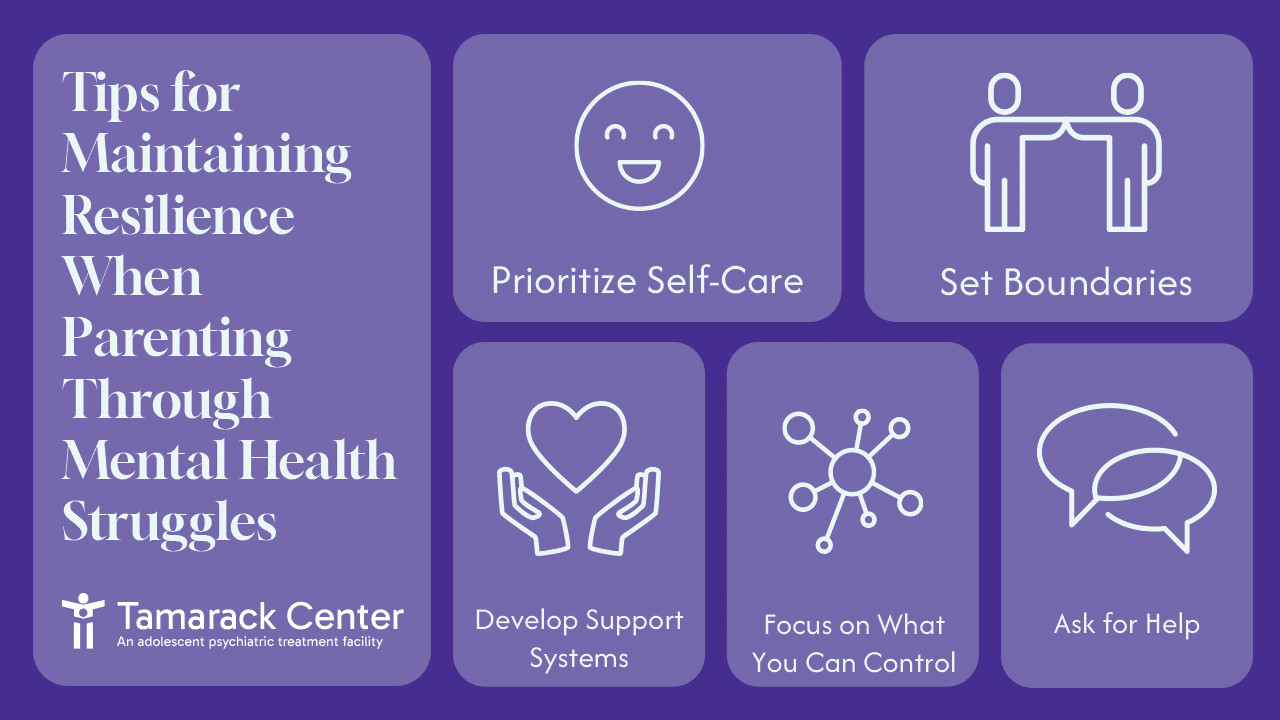When your child is struggling with mental health challenges, you want to do everything you can to support them. As most parents or guardians might, you may put your own needs aside and focus solely on them.
However, supporting a troubled teen can be extremely demanding. It can take a significant toll on your own mental, emotional, and physical well-being.
To provide the best support for your child, you need to make time to support yourself. As tricky as it may seem, taking time for your needs will make you more capable of supporting theirs.
Here we’ll offer a few teen mental health tips for parents, and how to maintain your resilience while supporting your child’s mental health.
We help teens break the cycle of destructive behaviors. Contact Tamarack Center to see how we can help.
5 Essential Tips for Maintaining Resilience When Parenting Through Mental Health Struggles

1. Prioritize Self-Care
It’s easy to lose track of your self-care when supporting your teen’s mental health. Their needs supersede yours, so much so that you can completely lose track of your needs.
To help with your emotional health, look for emotional outlets to manage stress. Talking with trusted friends and family can make you feel supported and validated. You might look for support groups for parents undergoing similar experiences. Or you might consider counseling for yourself.
Don’t neglect your physical health either. Our physical health can have a huge impact on our mental health. Create time for physical activity and exercise. Going for a walk, or a short hike in nature can increase blood flow and decrease stress levels.
Maintain healthy eating habits and get plenty of nutritious food. Overeating, not eating enough, or over-indulging in unhealthy foods can affect blood sugar levels and increase stress.
Try practicing relaxation techniques like mindfulness, breathing meditations, body-scan mediations, yoga, or progressive relaxation exercises. These can help reduce stress, reduce runaway worries, and promote your well-being.
By taking care of yourself and maintaining healthy habits you’re better equipped to provide the support your teen needs.
2. Set Boundaries
When your teen is struggling with a mental health disorder, you want to be there for them all the time. It’s important to be supportive, but you need to set some healthy boundaries. Having these boundaries will benefit you and your child. It provides you time to recharge and recover. And allows them to explore issues on their own.
It’s important to remind yourself that you can’t control your child’s behavior when they’re dealing with mental health concerns. You can only control how you respond.
Make sure you clearly communicate boundaries. Let your child know that you support them, but there may be times when you won’t be completely available. Or that certain behaviors aren’t acceptable even when they struggle with difficult feelings.
Use simple, direct language without yelling or harsh language. And check to make sure they understand.
You can start with small, easily achievable expectations. This can make boundaries less intimidating. And early wins build their resilience for more difficult challenges.
You can involve your child in setting expectations. Explain your concerns to them and offer them choices as to the best way to address them. This can provide a sense of ownership and increase the likelihood they’ll respect the defined boundaries.
It’s important to uphold expectations with consistency even when it’s difficult. Doing so provides predictability and stability. It helps your young people understand and appreciate these boundaries.
Stress that these boundaries are about specific behaviors, and not about the mental health condition your child may be struggling with. Make sure you offer positive reinforcement, noticing and celebrating small wins. This will encourage your child to continue respecting the boundaries you’ve set.
Work on developing a “respite care” system to give yourself an occasional break. This might involve asking family members or trusted friends to take the lead in supporting your child for a short time. It might involve enrolling your teen in a specialized program or a short-term stay away from home.
Having a way to give yourself a respite while making sure your child’s mental health challenges are supported can go a long way to keeping you healthy and recharged.
3. Develop Support Systems
Don’t forget to support yourself while supporting your child. Creating support systems for yourself is a powerful way to make sure you’re offering the best support to your child.
You can start at home by discussing ways to share support with your partner. That has the bonus of building respite support into your schedules.
If possible, connect with other parents of teens with mental health challenges. Being able to share with others who understand your struggles can help you feel connected and understood. It’s also an opportunity to ask questions, share strategies, and learn from others.
It’s also worth your time to see what support groups may be available. Support groups are usually organized around a single issue, and can sometimes be more helpful than peer groups.
The National Alliance on Mental Illness (NAMI) maintains a list of Family Support Groups. There are groups available all over the US. Some meet in person, and others online.
4. Focus on What You Can Control
When a child is in distress, our instinct is to do anything to help. Unfortunately, there’s only so much we can do when it comes to teen mental health. Trying to “fix” everything is an exercise in frustration, and will only add more stress to an already stressful situation.
Instead, identify and focus on the things you can control. Unless you’re a mental health professional, you’re ability to affect their illness will be limited. But you can provide a loving supportive environment and seek professional help for their condition.
Focus on your child’s progress, no matter how small. Celebrate those forward steps. This can make your child feel seen and appreciated, and rekindle your hope for a better future.
Try to manage your expectations for their improvement. Progress in youth mental health challenges is never linear. There will be good days and bad days. Sometimes you’ll see exceptional progress. Other times you’ll see setbacks. This is normal and to be expected. It’s all part of the process.
Think about your role in your child’s emotional health. You can listen to them, advocate for their emotional needs, find professional help, work with your child’s doctor, And provide caring, judgment-free feedback. You can provide unconditional support and validate their struggles.
Above all, you’re there to remind them that they are not their illness.
Having a clear understanding of what you can and can’t control will reduce stress and help you be a more effective support for your child’s emotional needs.
5. Ask for Help
Remember that it’s okay to ask for help. Seeking support is a sign of strength, not weakness.
It might be help from friends or family. Or you might seek professional help to assist you through a tough time.
This has the additional benefit of validating professional care for your child. When you seek professional care, it removes the shame or stigma teens and young adults may associate with therapy.
Residential Mental Health Treatment at Tamarack Center
Tamarack Center provides effective, compassionate treatment and children’s mental health support. We provide a safe environment, structured daily schedules, and recreational activities. Our staff includes a full-time child psychiatrist, pediatrician, clinical psychologist, Master’s level therapists, and a Master’s level teacher who provides for the residents’ education during their stay. And we have access to many other local resources.
We use evidence-based, effective treatment modalities for mental health conditions, such as Dialectical behavior therapy (DBT) and medication management when required.
Family members are an important part of our treatment team. You know your child better than anyone. Your insights and experiences play an important part in every treatment plan.
If your teen is experiencing a mental health crisis, we can help.
Is your teen struggling with mental health issues? Contact Tamarack Center to see how we can help.

